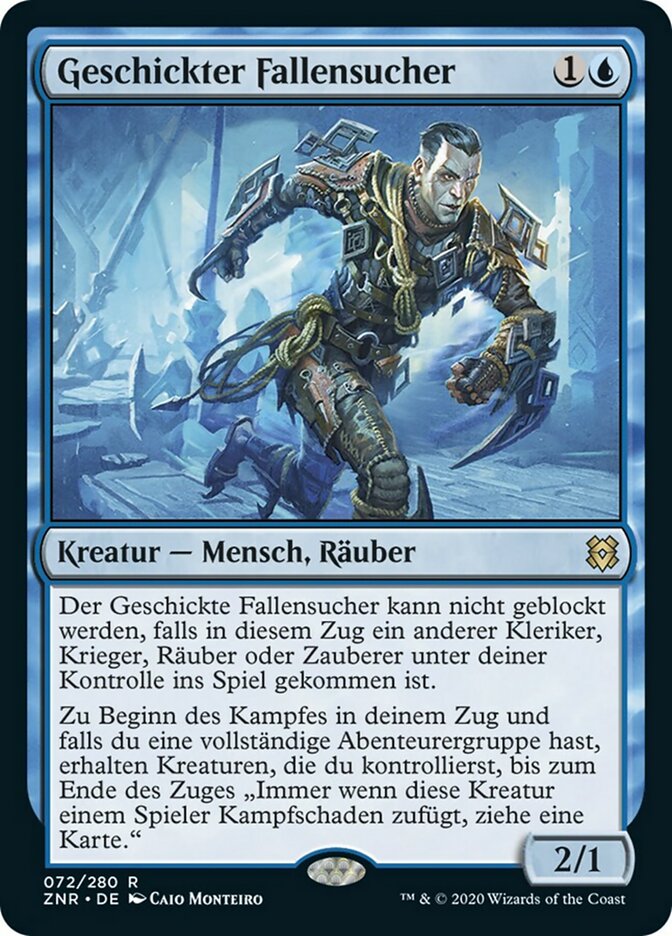
Geschickter Fallensucher {1}{U}
Kreatur — Mensch, Räuber
Der Geschickte Fallensucher kann nicht geblockt werden, falls in diesem Zug ein anderer Kleriker, Krieger, Räuber oder Zauberer unter deiner Kontrolle ins Spiel gekommen ist.
Zu Beginn des Kampfes in deinem Zug und falls du eine vollständige Abenteurergruppe hast, erhalten Kreaturen, die du kontrollierst, bis zum Ende des Zuges „Immer wenn diese Kreatur einem Spieler Kampfschaden zufügt, ziehe eine Karte.“
2/1
Illustrated by Caio Monteiro
- Standard
- Not Legal
- Alchemy
- Not Legal
- Pioneer
- Legal
- Explorer
- Legal
- Modern
- Legal
- Historic
- Legal
- Legacy
- Legal
- Brawl
- Legal
- Vintage
- Legal
- Timeless
- Legal
- Commander
- Legal
- Pauper
- Not Legal
- Oathbreaker
- Legal
- Penny
- Legal
Toolbox
Buy This Card
Notes and Rules Information for Geschickter Fallensucher:
- Only the English version of a Magic card receives Oracle updates and errata. View this card in English. (Scryfall note)
- Nimble Trapfinder’s first ability checks only whether a permanent entered the battlefield under your control earlier in the turn and had one of the party creature types as it entered. It doesn’t apply if an entering object gained the type later in the turn. It does apply if the entering object left your control since. It doesn’t matter whether Nimble Trapfinder was under your control as that object entered. (2020-09-25)
- Nimble Trapfinder’s second ability affects only creatures you control at the time it resolves. Creatures you begin to control later in the turn won’t get the triggered ability. (2020-09-25)
- After Nimble Trapfinder’s second ability has resolved, creatures you control keep the triggered ability for the turn even if you no longer have a full party later in the turn. (2020-09-25)
- To determine “the number of creatures in your party,” check whether you control a Cleric, whether you control a Rogue, whether you control a Warrior, and whether you control a Wizard. The number is the total number of those checks to which you answered yes. Each creature you control can be counted for only one of those checks. (2020-09-25)
- If a creature has more than one party creature type, and there are multiple ways to count that creature that could result in a different number of creatures in your party, the highest such number is used. For example, if you control a Cleric and a Cleric Wizard, the number of creatures in your party is two. You can’t choose to have it be just one by counting the Cleric Wizard first as a Cleric. (2020-09-25)
- An ability referring to the number of creatures in your party gets a number from zero to four. Such abilities never ask which creatures are in your party, and you never have to designate specific creatures as being in your party. You can’t choose to exclude creatures from this count to lower the number. (2020-09-25)
- Some cards refer to you having a “full party.” This is true if the number of creatures in your party is four. (2020-09-25)